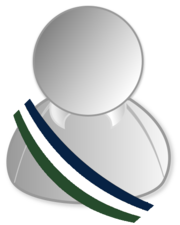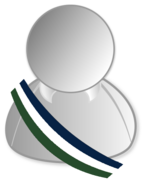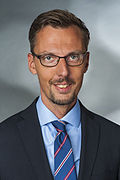President of Alsland: Difference between revisions
No edit summary |
|||
| Line 38: | Line 38: | ||
A Presidential candidate must be a citizen of Alsland who is at least 30 years old, has resided within Alsland for the last 10 years and doesn't currently hold any foreign citizenship. A Presidential candidate must also have gained at least 70,000 signatures of registered voters or any Alslandic citizen who is 16 or over or have been nominated by any political party with Federal or Provincial representation. | A Presidential candidate must be a citizen of Alsland who is at least 30 years old, has resided within Alsland for the last 10 years and doesn't currently hold any foreign citizenship. A Presidential candidate must also have gained at least 70,000 signatures of registered voters or any Alslandic citizen who is 16 or over or have been nominated by any political party with Federal or Provincial representation. | ||
Historically, a candidate must have been a member of the Folkssenaat to be eligible for the Presidency however this was removed after the [[Alsland|1937 Constitution]] was adopted. A candidate also had to have served in the Alslandic Armed Forces to be eligible, Senators who served in the Kirenian Army before Alslandic Independence such as [[Villem Mand]] and [[Kei Holwerda]] were also eligible for the Presidency. | Historically, a candidate must have been a member of the Folkssenaat to be eligible for the Presidency however this was removed after the [[Alsland|1937 Constitution]] was adopted. A candidate also had to have served in the Alslandic Armed Forces to be eligible, Senators who served in the Kirenian Army before Alslandic Independence such as [[Villem Mand]] and [[Kei Holwerda]] were also eligible for the Presidency before the adoption of the 1937 constitution removed this criteria. | ||
The Alslandic constitution limits a President to two five year terms in office. Previously, there was no limit to how many terms a President could seek but following the 1937 Constitution, official term limits were introduced for Presidents. Efforts were made to remove term limits from the constitution most notably in 1999 when Premier [[List of Premiers of Alsland|Adalbrecht Brötzmann]] attempted to have term limits removed but these efforts were defeated in the House of Representatives with most members opposing the plan. Then President Martina Scott also voiced her opposition to the proposal. | The Alslandic constitution limits a President to two five year terms in office. Previously, there was no limit to how many terms a President could seek but following the 1937 Constitution, official term limits were introduced for Presidents. Efforts were made to remove term limits from the constitution most notably in 1999 when Premier [[List of Premiers of Alsland|Adalbrecht Brötzmann]] attempted to have term limits removed but these efforts were defeated in the House of Representatives with most members opposing the plan. Then President Martina Scott also voiced her opposition to the proposal. | ||
Revision as of 10:17, 6 June 2021
This article is incomplete because it is pending further input from participants, or it is a work-in-progress by one author. Please comment on this article's talk page to share your input, comments and questions. Note: To contribute to this article, you may need to seek help from the author(s) of this page. |
| President of the United Provinces of Alsland | |
|---|---|
| Foarsitter fan de Feriene Provinsjes Aalslân Präsident der Vereinigten Provinzen von Aalslanden Alsmaa Ühendatud Provintside President | |
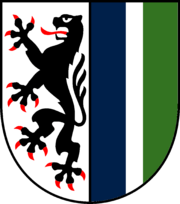 | |
| Style | His Excellency (in international relations only) |
| Status | Head of State |
| Residence | Mareikehûs (Yndyk) |
| Appointer | Popular vote |
| Term length | Five years Renewable once |
| Inaugural holder | Siemen Hartmann |
| Formation | 31 October 1919 |
| Salary | 100,000 € annually |
| Website | www |
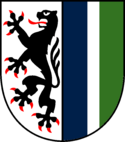 |
|---|
| This article is part of a series on the politics and government of Alsland |
|
|
The President of the United Provinces of Alsland (Dellish: Foarsitter fan de Feriene Provinsjes Aalslân, Weranian: Präsident der Vereinigten Provinzen von Aalslanden, Kirenian: Alsmaa Ühendatud Provintside President) is the head of state of Alsland.
The President of Alsland has considerably less power than it's counterparts in Gaullica but unlike the Azmaran Presidency, the Alslandic Presidency still exercises considerable powers in political affairs such as the ability to veto laws which could be seen as violating the constitution of Alsland and representing Alsland internationally. However most of the President's powers have been given to the Folkssenaat and Premier making the role of the Presidency little more than a Figurehead.
History
Selection process
Eligibility
A Presidential candidate must be a citizen of Alsland who is at least 30 years old, has resided within Alsland for the last 10 years and doesn't currently hold any foreign citizenship. A Presidential candidate must also have gained at least 70,000 signatures of registered voters or any Alslandic citizen who is 16 or over or have been nominated by any political party with Federal or Provincial representation.
Historically, a candidate must have been a member of the Folkssenaat to be eligible for the Presidency however this was removed after the 1937 Constitution was adopted. A candidate also had to have served in the Alslandic Armed Forces to be eligible, Senators who served in the Kirenian Army before Alslandic Independence such as Villem Mand and Kei Holwerda were also eligible for the Presidency before the adoption of the 1937 constitution removed this criteria.
The Alslandic constitution limits a President to two five year terms in office. Previously, there was no limit to how many terms a President could seek but following the 1937 Constitution, official term limits were introduced for Presidents. Efforts were made to remove term limits from the constitution most notably in 1999 when Premier Adalbrecht Brötzmann attempted to have term limits removed but these efforts were defeated in the House of Representatives with most members opposing the plan. Then President Martina Scott also voiced her opposition to the proposal.
Election
Candidates in a Presidential Election can be nominated by any political party with Federal or Provincial representation in the most recent election. A candidate can also be nominated if they receive 70,000 registered voters. Direct elections for the Presidency were introduced in 1940, previously the President was appointed by Senators and needed a plurality of Senators to vote for them to be appointed.
If no nominated candidate can secure a majority in the election, a second round will be held between the two candidates with the most votes. The candidate that secures the most votes in the second round is elected as President. If a candidate withdraws during the second round, the other candidate is the winner by default.
If only one candidate is nominated they will become President without an election being held. This has only occurred once when in 1940 Villem Mand was declared winner by default after no other nominees were put forward. The Functionalist candidate was disqualified and their signatures were discarded despite having enough signatures to be placed on the official ballot.
Results of the 2020 presidential election:
| Candidate | Party | ||||||
|---|---|---|---|---|---|---|---|
| Votes | % | ||||||
| Hepke Veltman | The Centre (supported by the Progressive Alliance and National Bloc) | 4,217,818 | 71.2 | ||||
| Juna Falkenberg | Greens and Socialists | GS | 562,770 | 9.5 | |||
| Esdert Yntema | National Rally | 550,922 | 9.3 | ||||
| Priit Laurits | ASAI (supported by the Worker's Party) | 248,803 | 4.2 | ||||
| Albert Hamilton | United Democratic Union | 207,336 | 3.5 | ||||
| Isa Jenkins | Independent (Supported by Vox Alsland and Future.as) | 88,858 | 1.5 | ||||
| Total | 5,924,420 | 100 % | |||||
| Valid votes | 5,900,722 | 99.6 | |||||
| Rejected votes | 23,697 | 0.4 | |||||
| Turnout | 5,924,420 | 60.4 | |||||
| Registered voters | 9,800,026 | ||||||
| Source: Department of Justice | |||||||
Inauguration
The President-elect, along with the Chief Justice of the Supreme Court, the Speaker of the Folkssenaat and the outgoing President assumes office on the TBD of TBD by taking the Presidential oath in the Chamber of the Folkssenaat in Dellish, Weranian and Swathish and in some cases Estmerish and Kirenian.
"I, (First Name, Surname) elected by the people of the United Provinces of Alsland as President of Alsland, hereby affirm my duties as stated in the constitution to uphold the Constitution of the Republic and the Laws of the Republic, and to work for the wellbeing of the citizens of the Alslandic state."
The term of the President-Elect begins after the swearing in, usually at mid-day. Following the inauguration the new President will deliver a speech to a session of the Folkssenaat before then being accompanied to inspect a guard of honour outside the Folkssenaat building. This is usually followed by a ceremonial wreath laying at the Tomb of the Unknown soldier in Yndyk to commemorate those who gave their lives in the defence of Alsland.
Duties and functions
Appointment of Federal and Provincial governments
Other appointments
Foreign relations

Other duties
Political affiliation
Most Alslandic Presidents are members of a political party and many have been former or current leaders or high ranking members of a party. The only exceptions to this were Tys Jonker between 1950-1960, Jimte Gorter who was appointed President following the death of Marshall Harvey and served from 1989-1990 and Gwen Ritter who was appointed as President following the resignation and served between 2008-2010.
Efforts have been made to make the Presidency a non-partisan position but all attempts have failed due to a lack of support and interest. The Presidency was intended to become a non-partisan position following the Liberation of Alsland but President Liuwke Talsma and Premier Villem Mand both objected to the proposal which subsequently was not included in the 1937 Constitution.
Succession
There is no office of Vice-President in Alsland, instead the Speaker of the Folkssenaat is designated as the official deputy of the President. If the office of President becomes vacant through resignation, death, illness or impeachment the Speaker of the Folkssenaat will become President and will serve the remainder of the former President's term or until they are able to fulfil their constitutional duties.
A President may temporarily hand over powers to the Speaker of the Folkssenaat. This has several times. The first instance was when President Liuwke Talsma delegated his powers as President to Vinzenz Lux shortly after the Liberation of Alsland when it was still unclear if Talsma was eligible for the position as President due to the period of time that had passed during the occupation of Alsland. The most recent instance of this was in 2020 when President Hepke Veltman delegated his powers to Arved Levandi whilst he was undergoing surgery after Veltman was injured after crashing his bicycle in a public park in Yndyk.
There are two cases of this happening in Alslandic history. On 1 December 1989, President Marshall Harvey suffered a massive heart attack and was pronounced dead when Paramedics arrived. The speaker of the Folkssenaat was Jimte Gorter who was sworn in an hour following Harvey's death. Gorter fulfilled the rest of Harvey's term until a successor could be chosen.
On 1 January 2008 following his impeachment and imminent removal from office President Onne Monsma announced his resignation as President. The speaker of the Folkssenaat was Gwen Ritter who was inaugurated shortly after Monsma's resignation. Ritter became the second female President and first Weranian-Kirenian President in Alsland. Ritter initially sought to stand for re-election in 2010 but due to health conditions she decided against standing for re-election.
Impeachment and removal
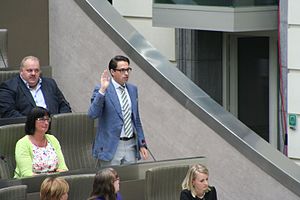
While in office, the president is not immune to prosecution. The only mechanism for a President to be removed from office by the Folkssenaat is by impeachment for any perceived act of breaking Alslandic law. In the event of a vote of impeachment, a session of the Folkssenaat will occur and all members must vote whether to remove the President from Office or to vote to keep a President in office. A 2/3rds majority is needed to impeach a President. If this is reached a President will be impeached and ineligible to run for any political office in Alsland unless the motion of impeachment is repealed by an act of the Folkssenaat. The impeachment case will then be passed onto the Alslandic supreme court which will decide if a President should be removed from office. If a majority on the supreme court decide to remove a President from office they will be removed immediately and the Speaker of the Folkssenaat will become President until the next election.
Impeachment has only occurred once in Alslandic history. During the 2008-2009 Alslandic political crisis, President Onne Monsma dismissed Premier Jabik Nieuwenhuis and appointed Jochen Schünemann to replace Nieuwenhuis. Nieuwenhuis and members of the Folkssenaat protested the dismissal which was seen as politically motivated and accused Monsma and Schünemann of corruption when it was revealed that Schünemann had offered Monsma the opportunity to succeed him as Premier. Following these allegations Schünemann was expelled from the Sotirian Union and a successor was appointed. The Folkssenaat later voted near unanimously with several members abstaining to impeach Monsma. Following his impeachment Monsma resigned to prevent being removed from office. Monsma and Schünemann were later arrested and spent 5 years each in jail for corruption.
Attempts at impeachment have occurred historically. Liuwke Talsma was impeached as President in 1930 after the 19XX Alslandic Coup. Talsma who along with Villem Mand was leading the Alslandic government in exile dismissed the impeachment and called the Folkssenaat: "illegitimate in it's current form." Upon the liberation of Alsland the impeachment was declared illegitimate by the supreme court alongside any other acts passed by the functionalist government.
In 1979, President Hinne Jorritsma faced an impeachment attempt after an affair with his secretary was revealed to the public. The impeachment attempt failed to gain much support and was defeated with a plurality of Senators abstaining on the vote.
Presidential office and symbols
Residence
Transportation
Office
List of presidents
| № | President | Term of office | Political Party | Elected | Premiers | |||
|---|---|---|---|---|---|---|---|---|
| Portrait | Name (Birth–Death) |
Took Office | Left Office | Days | ||||
| 1919-present | ||||||||
| 1 | 
|
Siemen Hartmann (1846-1924) |
31 October 1919 | 12 November 1920 | 378 | Independent | N/A | Himself |
| 2 | 
|
Kei Holwerda (1860-1934) |
12 November 1920 | 25 April 1925 | 1625 | Liberal Party | 1920 | Siemen Hartmann Douglas Cunningham Viktor Funke |
| 3 | 
|
Liuwke Talsma (1862-1945) |
25 April 1925 | 25 April 1940 | 5479 | Alslander Party | 1925 State of Emergency (1928-1934) 1935 |
Viktor Funke Tsjaable Wouda Villem Mand Sjemme Boersma |
| 4 | 
|
Villem Mand (1888-1991) |
25 April 1940 | 25 April 1945 | 1826 | Alslander Party | 1940 | Sjemme Boersma Djurre De Vos Laas Keuning |
| 5 | 
|
Adam Schmiedeberg (1874-1960) |
25 April 1945 | 25 April 1950 | 1826 | Alslander Party | 1945 | Laas Keuning Samuel Hudson |
| 6 | 
|
Tys Jonker (1902-1987) |
25 April 1950 | 25 April 1960 | 3653 | Independent | 1950 1955 |
Samuel Hudson Witte Reitsma |
| 7 | 
|
Dougie Hayes (1901-1967) |
25 April 1960 | 25 April 1965 | 1826 | Sotirian Democratic Front | 1960 | Witte Reitsma Eric Feigenspan Konrad Neuheuser Marshall Harvey |
| 8 | 
|
Boate Hamstra (1910-2001) |
25 April 1965 | 25 April 1970 | 1826 | Conservative Party | 1965 | Marshall Harvey |
| 9 | 
|
Hinne Jorritsma (1915-1993) |
25 April 1970 | 25 April 1980 | 3653 | United Democratic Union | 1970 1975 |
Marshall Harvey Urseltsje Van Der Hoek Stendert Snijder Declan Walker |
| 10 | 
|
Marshall Harvey (1908-1989) |
25 April 1980 | 1 December 1989 | 3507 | Sotirian Democratic Front | 1980 1985 |
Declan Walker Ygram Hoeksma |
| 11 | 
|
Jimte Gorter (1940) |
1 December 1989 | 25 April 1990 | 145 | Independent | N/A | Ygram Hoeksma |
| 12 | 
|
Martina Scott (1955) |
25 April 1990 | 25 April 2000 | 3653 | Socialist Party | 1990 1995 |
Adalbrecht Brötzmann |
| 13 | 
|
Drewes Brandsma (1967) |
25 April 2000 | 25 April 2005 | 1826 | The Centre | 2000 | Bonne Zijlstra Martina Scott |
| 14 | 
|
Onne Monsma (1957-2019) |
25 April 2005 | 1 January 2008 | 986 | Conservative Party | 2005 | Jabik Nieuwenhuis Jochen Schünemann |
| 15 | 
|
Gwen Ritter (1969) |
1 January 2008 | 25 April 2010 | 840 | Independent | N/A | Jabik Nieuwenhuis Asser Toman |
| 16 | 
|
Addik Kuiken (1963) |
25 April 2010 | 25 April 2015 | 1826 | Social Democrats in Delland | 2010 | Jonathan Fraser Aarnd Hellinga |
| 17 | 
|
Hepke Veltman (1959) |
25 April 2015 | Incumbent | 3500 | The Centre | 2015 2020 |
Aachtsje Wieringa Liliana Elliott Ottila Möller |
Living former presidents
- Living former presidents
Jimte Gorter
served 1989–1990
born 1940 (age 84)Martina Scott
served 1990–2000
born 1955 (age 69)Drewes Brandsma
served 2000–2005
born 1967 (age 57)Gwen Ritter
served 2008–2010
born 1969 (age 55)Addik Kuiken
served 2010–2015
born 1963 (age 61)
Timeline


